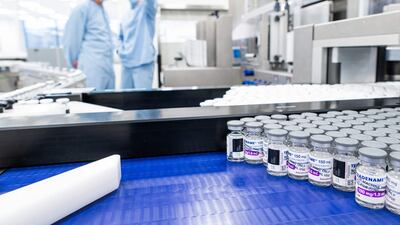Pharmaceutical company AstraZeneca swung to a pre-tax loss of £265 million in 2021 despite securing $4 billion in sales from its Covid-19 vaccine.
The London-listed company, which produces the vaccine in conjunction with the University of Oxford, recorded a slump in profit compared to the $3.92bn it made in 2020, even though it made $1.8bn in sales from its Covid-19 shot in the last three months of 2021 alone.
While the Anglo-Swedish company expects overall revenue to increase this year after five more drugs achieved bumper sales, it said it expects sales and profit margins on its pandemic-related products – such as its antibody treatment – to decline.
"AstraZeneca continued on its strong growth trajectory in 2021, with industry-leading R&D [research and development] productivity, five of our medicines crossing new blockbuster thresholds [achieving annual sales of $1bn or more] and the acquisition and integration of Alexion,” said Pascal Soriot, chief executive of AstraZeneca.
"We also delivered on our promise of broad and equitable access to our Covid-19 vaccine with 2.5 billion doses released for supply around the world, and we made good progress on reducing our greenhouse gas emissions."
Despite the loss for 2021, the company’s revenue jumped 38 per cent at constant exchange rates to $37.4bn, but its gains were wiped out by costs associated with its $39bn deal to buy US drug company Alexion Pharmaceuticals, as well as new drug research.
AstraZeneca, which has said low-income nations would continue to receive its vaccine on a no-profit basis after it began making a modest profit on the shot, set up a separate unit to focus on its coronavirus efforts and other respiratory infections.
The company committed to not taking a profit from the Covid-19 vaccine during the health crisis, but it now plans to shift to a for-profit model, with company growth expected to be driven by bumper sales of its antibody product Evusheld.
AstraZeneca expects 2022 revenue to increase by a percentage in the high teens, with core earnings growing by a percentage in the mid-to-high 20s.
The company, regarded by analysts as one of the fastest growing major drug producers due to its new cancer therapies, said it would top up its annualised dividend by $0.10 to $2.90, the first year-on-year increase in a decade.
AstraZeneca's share price jumped 3.7 per cent to top the FTSE 100 index in early trading on Thursday due to the company's forecast of higher 2022 sales.
A University of Oxford scientist this week blamed “bad behaviour” from politicians and leading figures in the science field for damaging the reputation of AstraZeneca's Covid-19 vaccine, causing a lack of confidence he believes “probably killed hundreds of thousands of people”.
Prof Sir John Bell, who helped drive the vaccine’s development, said the fallout was far-reaching and affected the worldwide battle against the coronavirus.
"They have damaged the reputation of the vaccine in a way that echoes around the rest of the world,” he said.
“I think bad behaviour from scientists and from politicians has probably killed hundreds of thousands of people – and that they cannot be proud of.”


